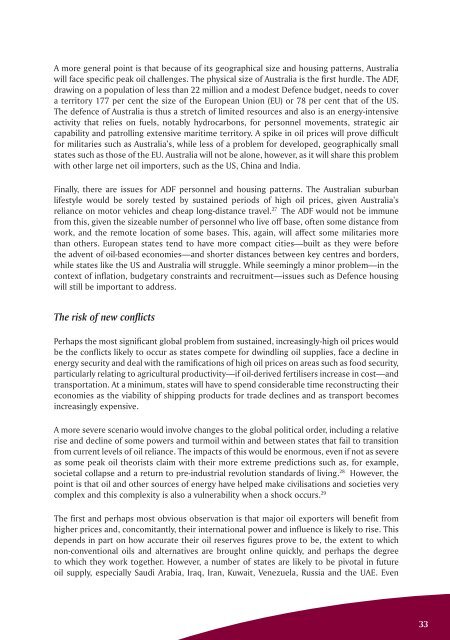ISSUE 180 : Nov/Dec - 2009 - Australian Defence Force Journal
ISSUE 180 : Nov/Dec - 2009 - Australian Defence Force Journal
ISSUE 180 : Nov/Dec - 2009 - Australian Defence Force Journal
- No tags were found...
Create successful ePaper yourself
Turn your PDF publications into a flip-book with our unique Google optimized e-Paper software.
A more general point is that because of its geographical size and housing patterns, Australiawill face specific peak oil challenges. The physical size of Australia is the first hurdle. The ADF,drawing on a population of less than 22 million and a modest <strong>Defence</strong> budget, needs to covera territory 177 per cent the size of the European Union (EU) or 78 per cent that of the US.The defence of Australia is thus a stretch of limited resources and also is an energy-intensiveactivity that relies on fuels, notably hydrocarbons, for personnel movements, strategic aircapability and patrolling extensive maritime territory. A spike in oil prices will prove difficultfor militaries such as Australia’s, while less of a problem for developed, geographically smallstates such as those of the EU. Australia will not be alone, however, as it will share this problemwith other large net oil importers, such as the US, China and India.Finally, there are issues for ADF personnel and housing patterns. The <strong>Australian</strong> suburbanlifestyle would be sorely tested by sustained periods of high oil prices, given Australia’sreliance on motor vehicles and cheap long-distance travel. 27 The ADF would not be immunefrom this, given the sizeable number of personnel who live off base, often some distance fromwork, and the remote location of some bases. This, again, will affect some militaries morethan others. European states tend to have more compact cities—built as they were beforethe advent of oil-based economies—and shorter distances between key centres and borders,while states like the US and Australia will struggle. While seemingly a minor problem—in thecontext of inflation, budgetary constraints and recruitment—issues such as <strong>Defence</strong> housingwill still be important to address.The risk of new conflictsPerhaps the most significant global problem from sustained, increasingly-high oil prices wouldbe the conflicts likely to occur as states compete for dwindling oil supplies, face a decline inenergy security and deal with the ramifications of high oil prices on areas such as food security,particularly relating to agricultural productivity—if oil-derived fertilisers increase in cost—andtransportation. At a minimum, states will have to spend considerable time reconstructing theireconomies as the viability of shipping products for trade declines and as transport becomesincreasingly expensive.A more severe scenario would involve changes to the global political order, including a relativerise and decline of some powers and turmoil within and between states that fail to transitionfrom current levels of oil reliance. The impacts of this would be enormous, even if not as severeas some peak oil theorists claim with their more extreme predictions such as, for example,societal collapse and a return to pre-industrial revolution standards of living. 28 However, thepoint is that oil and other sources of energy have helped make civilisations and societies verycomplex and this complexity is also a vulnerability when a shock occurs. 29The first and perhaps most obvious observation is that major oil exporters will benefit fromhigher prices and, concomitantly, their international power and influence is likely to rise. Thisdepends in part on how accurate their oil reserves figures prove to be, the extent to whichnon-conventional oils and alternatives are brought online quickly, and perhaps the degreeto which they work together. However, a number of states are likely to be pivotal in futureoil supply, especially Saudi Arabia, Iraq, Iran, Kuwait, Venezuela, Russia and the UAE. Even33
















